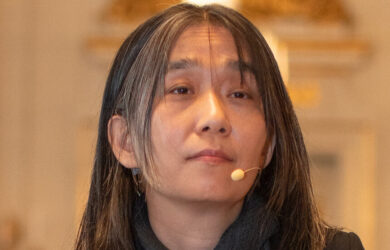
Ian Ralby has set up a company specialising in advising on strategic defence and security matters while working on international accountability standards for private security firms.
Since leaving Cambridge just two years ago, Ian Ralby has been involved in developing international standards for private security companies, advising various governments on international law and setting up his own international advisory group to counsel governments on strategic defence and security matters, tackling challenges from non-traditional angles in order to resolve tensions before they bubble over into crises.
The former Gates Cambridge Scholars Council external officer is now heading an organisation where his team includes a former British Army Major General, the head of command and control at the London Olympics and an array of experts and former military officers.
Ian’s London-based business, I.R. Consilium, Ltd. came about as a result of his extensive work with a number of different governments, but particularly the Swiss, British and Americans, as part of international efforts to develop accountability and oversight for the private military and security industry. Ian’s team has been built on strong personal connections developed before, during and since his time at Cambridge. For example, Ian got to know his Vice President, the Major General, during the “Research Methods” course they attended when starting their PhDs five years ago. He describes I.R. Consilium as “public service in the private sector”. The organisation works with governments and public organisations where there are problems of diminishing security to build their capacity to ensure stability and peace.
Caribbean
The projects Ian works on are varied. One area the organisation works in is the Caribbean where the focus is on both regulating the private security industry and overhauling national defence and security infrastructure, such as the coast guard, army and intelligence services.
Ian says the organisation follows a Japanese maxim: that vision without action is merely a daydream; but action without vision is always a nightmare. “We always ask why something is being done. It shouldn’t be haphazard. Countries recognise that they suffer from shiny object syndrome. They spend on things or buildings which, while attractive, have no impact on solving the problems they are supposed to help solve. We are more focused on human security issues and look at things from a different perspective. For instance, a country may say ‘we have a maritime security problem’ and we may say ‘yes, but primarily you have a fisheries problem’ and rather than creating a more hostile coast guard, we’ll develop a fisheries protection regime,” he says.
I.R. Consilium puts together bespoke panels of top-level international experts to investigate what the problems are and where the possible solutions can be found.
The experts have an initial meeting with the government concerned and then a scoping panel researches the issues that have come up. “Often the issues are very different from what the government thought,” says Ian. A full strategic audit is then done which takes into account the specific context, including the various cultural dynamics. “We work in partnership with the government. In other words, we are not consulting for them; we are working with them. We help them conduct a comprehensive and honest assessment of their challenges and existing capacity, work with them to develop a clear and realistic strategy and partner with them to get it implemented,” says Ian.
Accountability
For over three years, Ian has been intimately involved in negotiations to develop effective accountability for and oversight of the private security industry. Ian was one of the central drafters of and even co-chaired several of the final drafting sessions for the development of the International Code of Conduct for Private Security Service Providers.
Following on from that, Ian was heavily involved with the development of formal national and international standards for the industry, co-chairing the working group of two of them. The other principle follow-on from the Code has been an attempt to develop an International Oversight Mechanism – a task that has proved rather difficult. Ian has been involved in all the working groups to develop that mechanism and participated in the drafting conference in February 2013 that led to an initial Charter for its establishment.
He says one of the hurdles has been managing expectations. “When you put governments, civil society groups and industry together they are all coming from different starting points. You have to get everyone to recognise what is actually possible so that all sides can be working toward something doable rather than towards an unachievable ideal,” he says. Indeed, getting all three stakeholder pillars to come to terms with the economic and business realities of establishing the mechanism has been one of the most pervasive challenges and remains the key hurdle in actually establishing the body.
Ian himself has had to get to grips with what running a business is all about. He says he has learnt a lot and that he is enjoying the challenges. “I love the people I am working with. It’s a high level team and there is a lot I am learning. I have done a desk job before, but I am happier working this way,” he says.
Bosnia
At the same time he was setting up I.R. Consilium, Ian was asked to work for the law firm Picard, Kentz & Rowe LLP, advising the the government of Republika Srpska in Bosnia & Herzegovina on international law. He’s been working there two weeks a month for the last two years and says it has been a “terrific experience being embedded in government”. A lot of the country’s domestic laws are grounded in international law. There are also many issues around European Union integration, such as justice sector reform, that are challenging due to the unique structure of the Bosnian government. Ian acts as an interlocutor between government and international organisations and stakeholders to “try to resolve tensions before they become problems”, as he says. “A lot of the problems centre on communication. It’s amazing how much dialogue can resolve issues,” he states, adding that some groups don’t talk to each other and he has to act as a go between or ‘interested mediator’.
Gates Cambridge
Ian is hugely grateful to the Gates Cambridge Trust for its generous scholarship which ensured he didn’t emerge from Cambridge with too much debt and could take the risk of setting up on his own. He came to Cambridge in 2007 after working as a maritime, international and national security lawyer. He had become interested in post-conflict justice as an undergraduate at the University of Maryland Baltimore County where a study programme in Caux Switzerland landed him in the middle of the Sierra Leone Peace Process. Years later, while completing his Juris Doctor at William & Mary, he worked with the US Department of Justice as a clerk for the Iraqi High Tribunal which sentenced Saddam Hussein to death.
At Cambridge he did an MPhil which critiqued the jurisprudence of the Iraqi High Tribunal, arguing that, regardless of actual guilt or innocence, the court had misapplied the law in the Hussein trial. This segued into his PhD, titled “Private Military and Security Companies in the Uncharted Spaces of the Law”, examining the gaps in the accountability of private security companies and the relative merits of the ongoing efforts to close those gaps. That work fed directly into his active role in the international processes and led to him establishing I.R. Consilium.
“Cambridge changed my life,” he says. “It was the most amazing experience. Some of the most exceptional people on the planet pass through it. My heart will always be there.”
Picture credit: worradmu and www.freedigitalphotos.net












